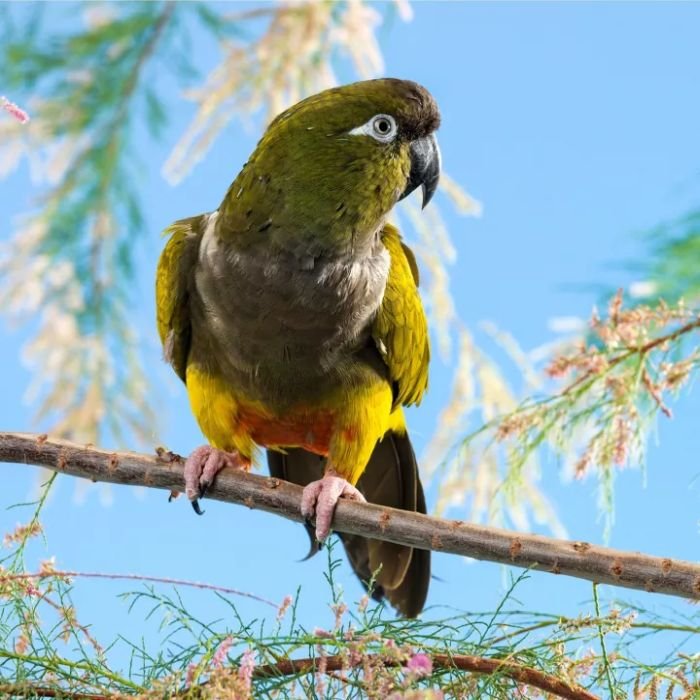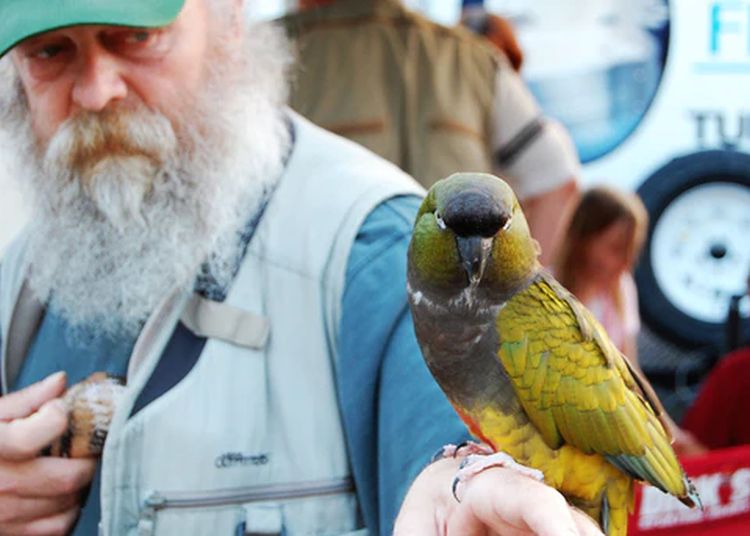
Welcome to our in-depth exploration of what it really costs to bring a Patagonian Conure into your life.
If you’ve landed here, chances are you’re captivated by the charm of these vibrant birds and are considering one as your next feathered companion.
While the upfront price tag of a Patagonian Conure is undoubtedly a key factor, understanding the full spectrum of expenses associated with their care is crucial.
In this article, we’ll not only unveil the initial purchase price but also guide you through the various cost elements – from the color and rarity of these birds, the reputation of breeders, to ongoing needs like health care, housing, nutrition, grooming, and enrichment.
Whether you’ve kept birds before or are just starting to explore the world of bird ownership, our comprehensive guide aims to equip you with all the necessary information to make an informed decision. So, let’s dive in and discover what it takes, financially and beyond, to be a proud owner of a delightful Patagonian Conure.
Contents
Initial Purchase Price of Patagonian Conures
The price range for a Patagonian Conure typically falls between $500 to $1,200, though this can vary depending on several key factors.
Body Size, Color, and Rarity
The color mutations and size of the Patagonian Conure can significantly impact its price. Standard colors are mostly dull green and grey, with yellow and red on the chest and blue wingtips.
However, rarer color mutations or unique marks can command higher prices. The size of these birds is also a factor, with adults measuring about 18 inches in length and weighing around 8.8 to 12.3 ounces.
Breeder Reputation
When delving into the pricing of Patagonian Conures, the reputation and expertise of the breeder are significant factors.
Expertise and Knowledge
Breeders with extensive experience and deep knowledge about Patagonian Conures often command higher prices. This expertise is not just in breeding but also in ensuring the birds are healthy, well-socialized, and genetically sound.
A reputable breeder’s deep understanding of the species’ needs, behavior, and care requirements translates into healthier and better-adjusted birds, which is a value-add for potential owners.
Quality and Health Assurance
Breeders with a strong reputation usually offer birds that have been raised in optimal conditions. They ensure that the birds receive proper nutrition, veterinary care, and living conditions, which contribute to their overall well-being. This level of care often justifies the higher price tag, as it reduces the likelihood of future health complications.
Ethical Breeding Practices
Reputable breeders are committed to ethical breeding practices. They focus not just on the physical health of the birds but also on their emotional and psychological well-being. These breeders avoid inbreeding and ensure genetic diversity, which is crucial for the long-term health of the species.
After-Sale Support
Many reputable breeders offer ongoing support after the sale. This can include advice on care, feeding, and training, which is particularly valuable for first-time bird owners. Such support ensures a smooth transition for both the bird and its new owner.
Network and Affiliations
Established breeders are often part of broader networks like bird clubs or associations. Websites like My Right Bird can help you connect with local bird clubs, where you can find information about reputable breeders in your area. These affiliations are a testament to their commitment and credibility in the avian community.
These breeders prioritize the health and genetic diversity of their birds, which can justify higher prices.

Location in the United States
The location within the United States can significantly impact the price of a Patagonian Conure due to various regional factors. Here’s how location can play a role:
Remote Areas: If you’re living in a more remote or less accessible area, like parts of Alaska or rural regions of the Midwest, you may find that the cost of a Patagonian Conure is higher. This increase is often due to additional transportation costs and the lack of local breeders. In remote areas, the limited availability of certain pets can drive up the price due to increased demand and lower supply.
Warmer vs. Colder Regions: In warmer regions of the U.S., like Florida or Southern California, where the climate is more similar to the Patagonian Conure’s natural habitat, it might be easier to find these birds. Breeders in these areas could potentially offer lower prices due to reduced overhead costs associated with creating a suitable environment for the birds. Conversely, in colder regions, such as the Northeast or the Pacific Northwest, additional costs for maintaining an appropriate living environment for the birds throughout the year might be factored into the selling price.
Metropolitan Areas vs. Rural Areas: In metropolitan areas with a higher concentration of potential buyers and bird enthusiasts, the competition among breeders can lead to more competitive pricing. However, in rural areas where there are fewer breeders and potential buyers, the prices might be higher due to the lack of competition and lower demand.
State and Local Regulations: Different states and localities have varying regulations regarding the breeding and sale of exotic pets, including birds like the Patagonian Conure. In areas with stricter regulations, compliance costs might lead to higher prices. Conversely, in regions with more lenient regulations, the cost might be lower.
Availability of Veterinary Services: Areas with readily available avian veterinary services may see a lower cost in pet birds since health care and maintenance are more accessible and possibly more affordable. In contrast, regions where such specialized services are scarce might see higher prices reflecting the increased difficulty in maintaining the bird’s health.
Cost Breakdown for Owning a Patagonian Conure
Health and Veterinary Costs
- Initial Veterinary Check-up: This usually includes a general health examination and any necessary vaccinations or tests. Costs can vary but typically range from $50 to $100.
- Routine Check-ups: Annual or biannual check-ups are recommended. Each visit might cost around $50 to $100.
- Emergency Care: Unplanned health issues can be more costly. Emergency visits can start at $100 and go up depending on the treatment needed.
Cage and Housing Expenses
- Cages: A suitable cage for a Patagonian Conure typically costs between $100 and $300. The price varies based on size, material, and design features.
- Accessories: Perches, nesting boxes, and other cage enhancements can add $50 to $100 to the initial setup cost.
Feeding and Nutrition
- Daily Diet: A mix of pellets, fruits, vegetables, and occasional treats is ideal. Monthly food costs can range from $20 to $40.
- Supplements: Vitamins and mineral supplements might be needed, especially if the bird’s diet lacks variety. These can add an additional $10 to $20 per month.
Toys and Enrichment for Patagonian Conures
Providing toys and enrichment activities is crucial for the mental and physical well-being of Patagonian Conures. These activities not only keep them entertained but also help in developing their cognitive abilities and preventing boredom-related behaviors. Here’s a breakdown of the costs and types of toys and enrichment activities:
Basic Toys
- Chewable toys (like wooden blocks or ropes): $5 – $15 each.
- Swings and ladders: $10 – $20.
- Bells and rattles: $3 – $10.
Interactive Toys
- Puzzle feeders: $15 – $30.
- Foraging toys: $10 – $25.
- Mirrors and interactive playthings: $5 – $20.
Replacement and Variety
- Regularly replace worn-out toys to maintain safety and interest.
- Budget about $10 – $50 every few months for replacements and new additions.
Enrichment Activities
- Include a variety of toys to stimulate different behaviors: climbing, chewing, foraging, and problem-solving.
- Budget an additional $20 – $40 every few months for these specialty items.
Regularly rotating toys and introducing new activities are essential for keeping your Patagonian Conure engaged and happy.
While some toys can be DIY or improvised, investing in high-quality, bird-safe toys is crucial for your bird’s safety and enjoyment.
